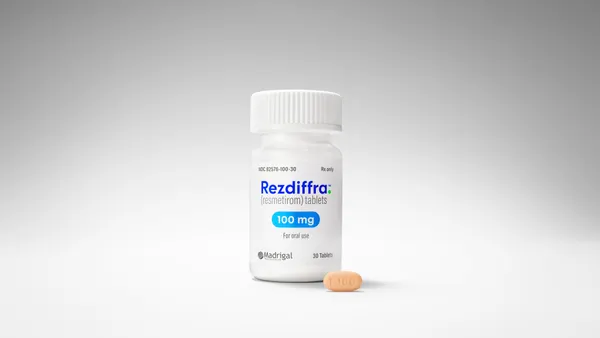American consumers want to take weight loss drugs and are confident in pharma companies’ ability to develop them, according to a new KFF Health Tracking Poll.
This eagerness makes sense, given the buzzy excitement around Novo Nordisk’s Ozempic, which has become pop culture shorthand in a way that’s rare for branded prescription drugs. Although Ozempic, an injectable form of the glucagon-like peptide-1 (GLP-1) receptor agonist semaglutide, is approved in the U.S. for adults with Type 2 diabetes, it has gained its notoriety for its off-label usage for weight loss, especially among celebrities.
The KFF poll found that nearly half of adults (45%) say they would generally be interested in taking a safe and effective prescription weight loss drug, including nearly six in 10 (59%) of those who are currently trying to lose weight and half (51%) of those who are trying to lose fewer than 10 pounds.
To put this demand — and sales potential — into perspective: Humira, the bestselling branded prescription drug of all time, is administered to about 300,000 Americans each year.
GLP-1 receptor agonists, which also include Novo Nordisk’s Wegovy and Eli Lilly’s Mounjaro, have high recognition among consumers, too: About 70% of adults say they’ve heard at least “a little” about this drug class, the poll showed. Among this class, semaglutide (Ozempic, Wegovy, Rybelsus) is the star.
In addition to being familiar with and interested in these drugs, 75% of consumers trust pharma companies to develop them. They also trust pharma companies to provide reliable information about safety and side effects (66%) and effectiveness (64%).
Where that trust erodes though, is with how those drugs are priced.
Just 22% say they trust pharma companies to price their products fairly. Moreover, cost and insurance coverage also contribute to whether consumers would actually use the weight loss products they’re interested in. For instance, only 16% would remain interested if they drug wasn’t covered by insurance.
This hesitation from consumers is justified because drugs like Ozempic and Wegovy often aren’t covered by insurance. Ozempic costs an average of $804 per month out of pocket, HealthLine reports, and many employers are cutting coverage for it because of the high price tag, among them the University of Texas, which said it will eliminate coverage for Wegovy and Saxenda (another Novo Nordisk drug) effective Sept. 1.
The cost is also putting a spotlight on the disparity between those who can afford to pay the high out-of-pocket price for Ozempic for weight loss and others who need the drug for Type 2 diabetes — its approved indication — but can’t access it.
The KFF poll also revealed other consumer hesitations about these weight loss drugs. For instance, consumers appeared skittish over Ozempic being administered as a routine injection; it not actually being approved for weight loss; and thinking they’d gain the weight back if they stopped taking it.
Beyond consumer interest in GLP-1 receptor agonists, Ozempic has been in the news and the talk of the scientific community for many other reasons.
For example, a woman in Louisiana is suing Novo Nordisk and Eli Lilly, claiming that they failed to adequately warn consumers about the possibility of adverse side effects, including gastroparesis, aka “paralyzed stomach.”
But on a more positive note, Ozempic is being studied for many other indications, such as Alzheimer’s disease, liver disease, chronic kidney disease, COVID-19 and others. In addition, Novo Nordisk just announced the results of a study finding that semaglutide 2.4 mg reduces the risk of major adverse cardiovascular events by 20% in overweight adults or those with obesity.
Similarly, a study published in the Annals of Internal Medicine in May found that GLP-1 receptor agonists are associated with fewer major adverse cardiovascular events than another type of diabetes drug (DPP4 inhibitors) in older veterans with no prior heart disease.








